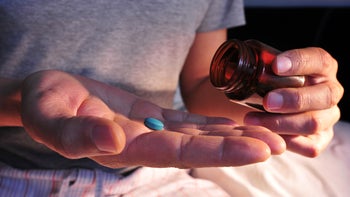sildenafil
Sildenafil (Viagra) is a tablet that's taken by mouth for erectile dysfunction (ED) in adults. It works as a phosphodiesterase-5 (PDE-5) inhibitor to help people get an erection or keep an erection that lasts for sex. You only take a dosage when you need it (usually about an hour, or anywhere from 30 minutes to 4 hours, before sex). Take sildenafil (Viagra) no more than once a day. Otherwise, it can put you at risk of serious side effects, such as vision loss or low blood pressure. Other more common side effects include headache and flushing. Sildenafil (Viagra) is a brand-name and generic medication.

What is Sildenafil (Viagra)?
What is Sildenafil (Viagra) used for?
How Sildenafil (Viagra) works
Sildenafil (Viagra) is a phosphodiesterase-5 (PDE-5) inhibitor. It blocks a protein in your body called PDE-5 to help with erections. It causes the muscles in the penis to relax so it can fill with blood when you're sexually aroused. When this happens, you have an erection.
Drug Facts
More on Sildenafil (Viagra) essentials

Get your GoodRx coupon

What are the side effects of Sildenafil (Viagra)?
Common Side Effects
- Headache (16-28%)
- Flushing (10-19%)
- Indigestion (3-17%)
- Changes in vision (e.g., color tinge, blurry vision, light sensitivity; 1-11%)
- Stuffy nose (4-9%)
Other Side Effects
- Back pain
- Muscle ache
- Dizziness
- Nausea
- Rash
Serious Side Effects
- Priapism: painful erection lasting for more than 4 hours
- Eye problems: vision loss, can't see as clearly, bloodshot eyes, burning feeling in the eye, eye swelling or pressure
- Dangerously low blood pressure: feeling faint, weak, or dizzy; blurry vision; racing heart; feeling confused
Source: DailyMed
More on Sildenafil (Viagra) side effects
The following side effects have also been reported
Along with its needed effects, a medicine may cause some unwanted effects. Although not all of these side effects may occur, if they do occur they may need medical attention.
Check with your doctor immediately if any of the following side effects occur:
Less common
Bladder pain
burning feeling in the chest or stomach
burning, crawling, itching, numbness, prickling, "pins and needles", or tingling feelings
cloudy or bloody urine
dizziness
increased frequency of urination
indigestion
pain on urination
stomach upset
tenderness in the stomach area
Rare
Abnormal vision
behavior change similar to drunkenness
bleeding of the eye
blurred vision
bone pain
breast enlargement
chills
cold sweats
confusion
convulsions (seizures)
cool and pale skin
deafness or hearing loss
decrease in amount of urine or the frequency of urination
decreased vision
difficulty in concentrating
dizziness or lightheadedness, especially when getting up suddenly from a lying or sitting position
double vision
drowsiness
dryness, redness, scaling, or peeling of the skin
excessive hunger
fainting or faintness
fast, irregular, or pounding heartbeat
feeling of something in the eye
fever or chills
headache (severe or continuing)
increase in the size of the pupil
increased sweating
increased thirst
lower back or side pain
migraine headache
nausea (severe or continuing)
nervousness
nightmares
numbness of the hands
painful, swollen joints
prolonged, painful erection of penis
redness, burning, or swelling of the eyes
redness, itching, or tearing of the eyes
restless sleep
seeing shades of colors differently than before
sensitivity to light
shakiness
skin lesions with swelling
skin paleness
skin ulcers
slurred speech
sudden weakness
swelling of the face, hands, feet, or lower legs
trouble breathing
twitching of the muscles
unusual feeling of burning or stinging of the skin
unusual tiredness or weakness
vision changes
vision loss, temporary
Incidence not known
Blindness
Some side effects may occur that usually do not need medical attention. These side effects may go away during treatment as your body adjusts to the medicine. Also, your health care professional may be able to tell you about ways to prevent or reduce some of these side effects. Check with your health care professional if any of the following side effects continue or are bothersome or if you have any questions about them:
More common
Aches or pains in the muscles
bloody nose
difficult or labored breathing
flushing
headache
pain or tenderness around the eyes and cheekbones
redness of the skin
stomach discomfort following meals
stuffy or runny nose
trouble sleeping
unusually warm skin
Rare
Abdominal or stomach pain
abnormal dreams
clumsiness or unsteadiness
diarrhea or stomach cramps (severe or continuing)
difficulty in swallowing
ear pain
increased amount of saliva
increased skin sensitivity
lack of coordination
loss of bladder control
mental depression
numbness or tingling of the hands, legs, or feet
rectal bleeding
redness or irritation of the tongue
redness, soreness, swelling, or bleeding of the gums
ringing or buzzing in the ears
sensation of motion, usually whirling, either of one's self or of one's surroundings
sexual problems in men (continuing), including failure to experience a sexual orgasm
sleepiness
sores in the mouth and on the lips
tense muscles
trembling and shaking
vomiting
waking to urinate at night
worsening of asthma
Other side effects not listed may also occur in some patients. If you notice any other effects, check with your healthcare professional.
Call your doctor for medical advice about side effects. You may report side effects to the FDA at 1-800-FDA-1088.

Pros and cons of Sildenafil (Viagra)

Pros
A first-choice medication for ED
Taken only when you need it
Can take it 30 minutes to 4 hours before sexual activity
Comes in different strengths, so you and your prescriber can find which works best for you

Cons
Can take up to an hour to get its full effect
Higher risk of side effects for people 65 years and older
Not recommended if you've had a heart attack or stroke in the past 6 months
Can't take if you've recently taken nitrates like isosorbide dinitrate (Isordil) or nitroglycerin (Nitrostat)

Pharmacist tips for Sildenafil (Viagra)

It's best to take sildenafil (Viagra) about 1 hour before sex. But you can also take it anywhere between 30 minutes and 4 hours before you need it.
You can take sildenafil (Viagra) with or without food, but it usually works best when taken on an empty stomach. The medication might take a little longer to start working after you eat a high-fat meal (like a cheeseburger with fries).
Don't take sildenafil (Viagra) any more than once per day. Otherwise, it can raise your risk of serious side effects, such as dangerously low blood pressure and vision problems.
Ask your prescriber what's a safe amount of alcohol to drink while taking sildenafil (Viagra). They might recommend that you drink less or avoid alcohol altogether. Alcohol can make some side effects worse. This can include dizziness, flushing, and stomach upset. Heavy drinking can also actually worsen ED.
Let your prescribers and pharmacists know you're taking sildenafil (Viagra). Also tell them about all your other medications. Sildenafil (Viagra) can interact with many medications, including blood pressure medications. It can make your blood pressure drop too low. Your care team can make sure your medications are safe for you to take together.
If you have an erection for more than 4 hours or if you feel pain with the erection after taking sildenafil (Viagra), go to the emergency room right away. If left untreated, it can lead to permanent damage to your penis.
Be sure to continue to practice safe sex and use a condom. Sildenafil (Viagra) doesn't stop the spread of sexually transmitted diseases (STDs).
More on Sildenafil (Viagra) tips

Frequently asked questions about Sildenafil (Viagra)

How to save using GoodRx




What are the risks and warnings for Sildenafil (Viagra)?
Sildenafil (Viagra) can cause some serious health issues. This risk may be even higher for certain groups. If this worries you, talk to your doctor or pharmacist about other options.

Risk of heart problems in people with heart disease
Risk factors: History of a heart condition | Recent heart attack or stroke in the past 6 months | High or low blood pressure
Before taking sildenafil (Viagra), tell your prescriber if you have any heart problems. Having sex can be risky for people with certain heart conditions. Sildenafil (Viagra) is used for having sex. Because of this, it might not be the best choice for people whose prescriber has told them not to have sex to be safe.
In addition, sildenafil (Viagra) hasn't been studied in people who've had a heart attack, stroke, or irregular heart rhythm in the last 6 months. It also hasn't been studied in people with heart failure or unstable angina (chest pain). If you have a heart problem, talk to your prescriber to find out if this medication is safe for you.

Low blood pressure
Risk factors: Taking alpha blockers | Taking medications for high blood pressure or chest pain (angina) | Taking ritonavir (Norvir)
Sildenafil (Viagra) can cause temporary low blood pressure. This usually doesn't cause problems. But it can for people with health conditions that are sensitive to changes in blood pressure.
Keep in mind that your blood pressure can get too low if you take sildenafil (Viagra) with certain medications. These include blood pressure medications. It also includes alpha blockers like tamsulosin (Flomax).
You should never take sildenafil (Viagra) when taking a nitrate medication for chest pain (angina). This combination can make your blood pressure drop dangerously low.
Tell your prescriber about all your health problems and medications you take. Your prescriber can check that sildenafil (Viagra) is safe for you to take. If you take this medication, be very careful getting up after sitting or lying down. This can help prevent you from feeling dizzy from low blood pressure and possibly falling.

Prolonged or painful erection (priapism)
Risk factors: Medical conditions that affect the penis | Sickle cell anemia | Multiple myeloma | Leukemia
It's not common, but some people who took sildenafil (Viagra) have had an erection that lasted more than 4 hours (priapism). Sometimes, it can be painful. If it's not treated in time, it can lead to permanent damage to your penis.
Tell your prescriber about your medical conditions. You're at higher risk of priapism if you have other conditions affecting your penis. The risk might also be higher if you have sickle cell anemia, multiple myeloma, or leukemia.
If you have an erection that lasts longer than 4 hours or a painful erection, get medical help right away.

Vision changes
Risk factors: "Crowded" optic disc
If you suddenly notice changes in your vision in one or both of your eyes, go to the emergency room or call your prescriber right away. Although this is rare, sildenafil (Viagra) might raise the risk of eye damage. This can potentially lead to permanent vision loss.
Before starting sildenafil (Viagra), tell your prescriber about your full medical history. If your eye specialist has told you that you have a "crowded" optic disc, you might be at higher risk of vision changes with this medication. Your prescriber can decide if sildenafil (Viagra) is right for you based on the risks and benefits.

Hearing loss
Some people who took sildenafil (Viagra) had problems with hearing. Sometimes, this happened along with ringing in the ears (tinnitus) and dizziness. It's not clear if these problems are directly related to sildenafil (Viagra). If you notice any changes in your hearing in one or both of your ears, stop taking this medication and call your prescriber right away.

Interactions with other medications
Risk factors: Taking nitrate medications | Taking blood pressure medications | Taking alpha blockers | Taking certain antifungals or antivirals | Taking other ED medications at the same time
Sildenafil (Viagra) can interact with certain medications. These drug interactions can raise your risk of side effects, including dangerously low blood pressure.
Don't take sildenafil (Viagra) with nitrates. These include nitroglycerin (Nitrostat) and isosorbide dinitrate (Isordil). It can cause your blood pressure to drop too low. Sildenafil (Viagra) can also interact with blood pressure medications. Other drug interactions are with certain antifungals and antivirals like ritonavir (Norvir). They can raise the risk of side effects like headaches and flushing.
It's important to tell your prescriber and pharmacist about all the medications you take and plan to take. They can make sure all your medications are safe to take together and adjust them to keep you safe if needed.
More on Sildenafil (Viagra) warnings

Sildenafil (Viagra) dosage forms
Typical dosing for Sildenafil (Viagra)
The typical dose is 50 mg taken by mouth about 1 hour before sex, as needed. You can also take it anywhere from 30 minutes to 4 hours before sex.
Your dose might be lower if you're an older adult or if you have liver or kidney problems. Your prescriber can also adjust the dose depending on how it works for you and if you have side effects. The maximum recommended dose is 100 mg.
Don't take sildenafil (Viagra) more than once a day (at any dose).
More on Sildenafil (Viagra) dosage forms

Sildenafil (Viagra) Reviews
GoodRx has partnered with PatientsLikeMe to provide reviews on the different aspects of Sildenafil (Viagra).
Effectiveness
Learn more about the effectiveness of Sildenafil (Viagra) based on real life experiences.
Overall Rating
Based on 14 people taking this medication
4.2
Effectiveness by condition:
erectile dysfunction10 reviews
3.8
pulmonary hypertension4 reviews
4.7
Severity of side effects
Based on 28 people taking this medication
0%
50%
100%
Top side effects
Headaches
18%
Acid reflux
4%
Nasal congestion
4%
Vision abnormalities (halos/floaters/snow)
4%
Upset stomach
4%
Reasons people stopped taking Sildenafil (Viagra)
Based on 34 people who have taken this medication
Expense
39%
Did not seem to work
27%
Doctor's advice
9%
Other
9%
Side effects too severe
9%
Change in health plan coverage
3%
Course of treatment ended
3%
Personal research
3%
How long people take Sildenafil (Viagra)
Based on 76 people taking this medication
0%
50%
100%

Interactions between Sildenafil (Viagra) and other drugs
More on Sildenafil (Viagra) interactions
Using this medicine with any of the following medicines is not recommended. Your doctor may decide not to treat you with this medication or change some of the other medicines you take.
- Amprenavir
- Amyl Nitrite
- Atazanavir
- Boceprevir
- Cobicistat
- Darunavir
- Erythrityl Tetranitrate
- Fosamprenavir
- Indinavir
- Isosorbide Dinitrate
- Isosorbide Mononitrate
- Lopinavir
- Molsidomine
- Nelfinavir
- Nitroglycerin
- Nitroprusside
- Pentaerythritol Tetranitrate
- Propatyl Nitrate
- Riociguat
- Ritonavir
- Saquinavir
- Telaprevir
- Tipranavir
Using this medicine with any of the following medicines is usually not recommended, but may be required in some cases. If both medicines are prescribed together, your doctor may change the dose or how often you use one or both of the medicines.
- Cannabis
- Ceritinib
- Clarithromycin
- Conivaptan
- Dihydrocodeine
- Duvelisib
- Fluconazole
- Fosnetupitant
- Idelalisib
- Itraconazole
- Ivosidenib
- Larotrectinib
- Lefamulin
- Lorlatinib
- Lumacaftor
- Nefazodone
- Netupitant
- Simeprevir
- Telithromycin
- Voriconazole
Using this medicine with any of the following medicines may cause an increased risk of certain side effects, but using both drugs may be the best treatment for you. If both medicines are prescribed together, your doctor may change the dose or how often you use one or both of the medicines.
- Alfuzosin
- Bosentan
- Bunazosin
- Ciprofloxacin
- Delavirdine
- Doxazosin
- Erythromycin
- Etravirine
- Ketoconazole
- Moxisylyte
- Nebivolol
- Prazosin
- Rifapentine
- Silodosin
- Tamsulosin
- Terazosin
- Trimazosin

How much does Sildenafil (Viagra) cost?

Sildenafil (Viagra) contraindications
Taking a nitrate medication for chest pain (angina)
Taking guanylate cyclase (GC) stimulators, such as Adempas (riociguat)
History of allergic reaction to sildenafil (Revatio)

What are alternatives to Sildenafil (Viagra)?

What is the latest news about Sildenafil (Viagra)?

Sildenafil (Viagra) images
Get savings updates for Sildenafil (Viagra)
Receive price alerts, news, and other messages from GoodRx about Sildenafil (Viagra) and other healthcare topics and relevant savings offers.By providing your email, you consent to receive marketing communications from GoodRx, which may include content and/or data related to men’s health, women's health, reproductive care, or sexual health. You agree to the GoodRx Terms of Use and acknowledge the Privacy Policy. You can unsubscribe at any time.
Compare other Erectile Dysfunction drugs
Browse medications
View AllResearch prescriptions and over-the-counter medications from A to Z, compare drug prices, and start saving.























